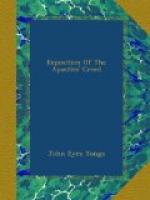Our Lord brought life and immortality to light, and taught men that between the Church militant and the Church triumphant there is indissoluble fellowship. Those who followed holiness in this life are saints still in the life to which they have passed. In the Epistle to the Hebrews, believers are told that they “are come to the general assembly and church of the firstborn, which are written in heaven ... and to the spirits of just men made perfect."[195]
While the clause was probably inserted at first to vindicate the doctrine of communion of saints in this life, it has long been regarded as extending to a communion subsisting between the spirits of just men made perfect and followers of the Lord Jesus Christ who are still on earth. The passage last quoted justifies the inference that death does not suspend the fellowship which believers in Jesus Christ have with Him, their common Lord. Death separates the soul from the body, but it does not cut off the dead from communion with the Father or the Son. He who is the God of Abraham, of Isaac, and of Jacob is the God not of the dead, but of the living. Of the whole family of the saints, some are in heaven and some on earth, and, between those who are there and those who are here, there is communion. Since the heavenly Church received Abel as its first member, there has been unceasing fellowship between militant and glorified saints. Those who are here are shut out by the tabernacle of the body from personal intercourse with the souls of the departed, but are yet in a fellowship with them that is very real and precious. The holy dead act upon the living, and, it may be, are reacted upon in ways we do not understand. Of Abel we are told that “being dead, he yet speaketh."[196] Those whom death has taken do not cease to exert an influence on the lives of friends left behind. Their example, their good deeds, their writings, the undying consequences of what they did while on earth affect us. The veil which death interposes between us and them hinders us from witnessing their spirit life, and we know not whether, or in what measure, or how, they contemplate us. We do not go to them




